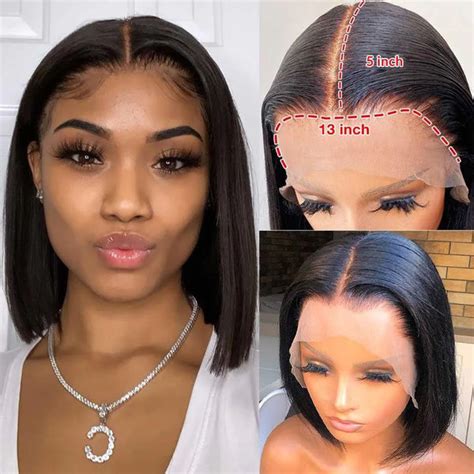Lace wigs have become increasingly popular in recent years due to their natural-looking and versatile nature. Frontal lace wigs, in particular, offer a seamless and realistic hairline that blends effortlessly with your skin tone. If you’re considering investing in a frontal lace wig, here are 10 must-haves for a flawless look:

1. Human Hair vs. Synthetic Hair
- Human hair wigs are more expensive but offer a natural look and feel. They can be styled and colored like your own hair.
- Synthetic hair wigs are more affordable and easier to maintain, but they may not look as natural and can be more prone to tangling.
2. Hair Texture
- Choose a hair texture that matches your natural hair for a seamless blend.
- For straight hair, opt for a silk-straight or Brazilian straight texture.
- For curly hair, consider a deep-wave or curly texture.
3. Lace Material
- Lace wigs are made with a delicate lace material that creates an invisible hairline.
- Swiss lace is the most durable and transparent, but it’s also the most expensive.
- French lace is less durable but more comfortable.
- HD lace is a new type of lace that is ultra-thin and invisible.
4. Hair Density
- Hair density refers to the amount of hair on the wig.
- Choose a hair density that matches your natural hair volume.
- A density of 130% is considered light, while a density of 180% is considered heavy.
5. Length
- Choose a wig length that complements your face shape and lifestyle.
- Short wigs are less noticeable but require more maintenance.
- Long wigs offer more styling options but can be heavy and difficult to manage.
6. Cap Construction
- The cap construction determines how the wig is attached to your head.
- A lace-front cap has lace only at the front, while a full-lace cap has lace all around the perimeter.
- A glueless cap uses adjustable straps and combs to secure the wig.
7. Price
- Frontal lace wigs can range in price from $200 to $2,000.
- The price will vary depending on the quality of the hair, lace, and construction.
8. Customization
- Some wig sellers offer customization options such as bleaching the knots, plucking the hairline, and adding baby hairs.
- Customization can make your wig look even more natural.
9. Maintenance
- Frontal lace wigs require regular maintenance to keep them looking their best.
- Wash and condition your wig every 2-3 weeks.
- Use products designed specifically for lace wigs.
- Avoid over-manipulating the wig, as this can damage the lace.
10. Styling
- Frontal lace wigs can be styled like your own hair.
- Use heat-resistant tools to style synthetic hair wigs.
- Avoid using harsh chemicals on human hair wigs.
How to Choose the Right Frontal Lace Wig
- Consider your hair texture, skin tone, face shape, and lifestyle.
- Decide on the type of lace material, hair texture, hair density, length, cap construction, and price that best suits your needs.
- Read reviews from other customers before making a purchase.
How to Apply a Frontal Lace Wig
- Prepare your natural hair by washing, conditioning, and detangling it.
- Apply a wig cap to protect your natural hair.
- Apply a thin layer of adhesive to the hairline of the wig.
- Place the wig on your head and adjust it until it fits comfortably.
- Use a comb or brush to blend the wig with your natural hair.
How to Maintain a Frontal Lace Wig
- Wash and condition your wig every 2-3 weeks.
- Use products designed specifically for lace wigs.
- Avoid over-manipulating the wig.
- Store your wig on a wig stand or in a cool, dry place.
Conclusion
Frontal lace wigs are a versatile and stylish way to achieve a natural-looking hair transformation. By following these tips, you can choose and maintain the perfect frontal lace wig for your individual needs.
